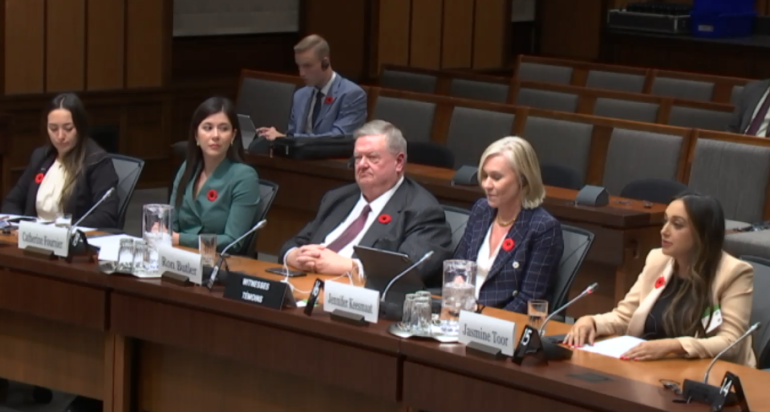Representatives from Canada’s mortgage industry presented the federal government with several proposals they say will help address the country’s housing affordability crisis.
Earlier this week, Jasmine Toor of Mortgage Professionals Canada and Ron Butler of Butler Mortgage were among housing expert witnesses invited to speak before the House of Commons Standing Committee on Finance.

Banning short-term rentals, such as Airbnb, across the country was one of the recommendations of Ron Butler of Butler Mortgage, who said it would have an immediate impact on releasing locked up housing inventory.
“We are depriving long-term tenants of these locations and we are also depriving people who could purchase those properties,” he told the committee.
“A ban on short-term rentals would create immediate change [and] that would reduce prices instantly,” he added. “It would discourage developers in the private sector from building micro-condos, from building a 385-square-foot condo, which is frankly ridiculous. It would eliminate the desire to create that product because there’s no market for it other than as an Airbnb. So the release of inventory into the [market] would be immediate.“
He also said high development fees, local taxes, red tape and “NIMBY-ism” [‘Not-In-My-Back-Yard] have prevented certain areas from being up-zoned to allow for the construction of multi-unit dwellings.
“There really is no reason why the provincial mandates to increase zoning in municipal areas, to allow for multiple(-unit) dwellings, shouldn’t be forcibly endorsed by the government.”
Targeted measures to assist first-time buyers
Jasmine Toor, Director of Government Affairs for Mortgage Professionals Canada, argued in favour of targeted policy changes to help first-time buyers who are struggling to get a foothold in the housing market.
She cited statistics from the association’s recent consumer survey that the percentage of non-homeowners who believe they’ll never be able to afford a home rose 15 percentage points to 48% in just six months.

“Some believe that any policy that increases the purchasing power of first-time homebuyers will stoke demand and drive up housing prices,” Toor said. “But in reality, there are many targeted measures the government could adopt, which would have a minimal impact on prices while making housing more accessible.”
Toor walked the committee through several of those options, which are currently Mortgage Professionals Canada’s top federal policy recommendations. Those include eliminating the mortgage stress test on uninsured mortgage transfers and a return to 30-year amortization periods for insured mortgages.
Another is increasing the insured mortgage cut-off from $1 million to $1.25 million and index it to inflation—a promise previously made by the current Liberal government, but not yet delivered on.
“This would enable first-time homebuyers and young families, particularly those in urban settings, to achieve their dreams of homeownership,” she said, noting that many are finding it difficult to come up with the 20% down payment needed for an uninsured mortgage and are subsequently being priced out of the market.
She cited data from Canada Guarantee that suggests the increase in the insured mortgage cut-off would have a “very small impact on stimulating housing market demand,” given that it would represent roughly 1% of the overall market.
CRA income verification to crack down on mortgage fraud
Both Toor and Butler also talked about the need for a digital income verification tool in order to crack down on mortgage fraud, which would allow lenders to verify a borrower’s income securely with the Canada Revenue Agency (CRA).
Toor said the association is currently in discussions with the CRA about the idea and that she understands the department is currently working on a solution in that regard.
Asked directly by the committee whether he supported the implementation of such a tool, Butler replied, “it would be my greatest wish.”
“There is way too much income document fraud in Canada. It would be very useful and a very simple fix to simply say ‘CRA, we need some linkage to the big banks who have highly secure systems. If we have a document that the borrower has provided us, let’s just verify that one single box on that notice of assessment, line 15,000.”
Canada’s banking regulator, the Office of the Superintendent of Financial Institutions, also recently confirmed its support for such an income verification tool.
“We welcome any initiative that advances our B-20 expectation that FRFIs [federally regulated financial institutions] use income sources that are independently verifiable and difficult to falsify,” OSFI said in a recent report. “We and our federal financial sector partners are aware of ongoing CRA efforts in this regard.”
MPC said it is continuing to find solutions, tools, and explore strategies to combat fraud, having most recently met yesterday with National Revenue Minister Marie-Claude Bibeau.








Principle residence interest deductibility up to a $1M cap paired with 2 year replacement property rules to replace principle residence capital gains exemption. Reduce bloated government spending in line with the expected revenue drop. The government has had their chance taxing us to death to run their programs – time to give people purchasing power to start driving the economy again.
All of this was fine for a decade until it started to show in the Liberals’ poll numbers. It didn’t matter one bit! What the heck did people think was going to happen when prices went up 10% each year? What did they expect? Zero logical thinking to the end – or unfettered greed and short-termism.
Why would the CRA allow validation of tax documents (income) when the RE market brings in so much Fed/Prov tax income? Lets not forget we have ‘investors’ with ML targets to meet :)